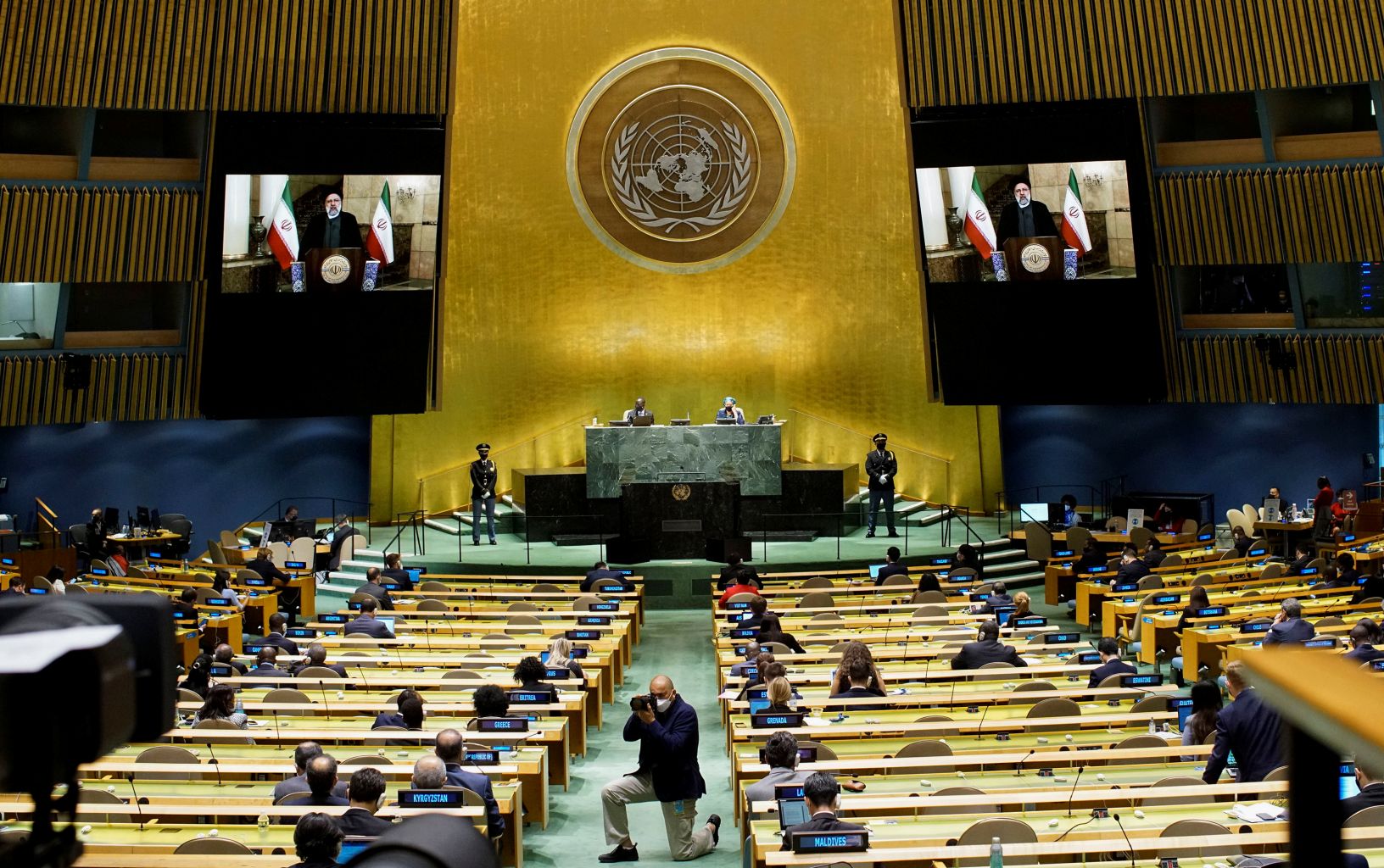Iran wants nuclear talks that lead to lifting of US sanctions, president says
Sign up now: Get ST's newsletters delivered to your inbox

Iran President Ebrahim Raisi remotely addresses the 76th Session of the UN General Assembly in a pre-recorded video.
PHOTO: REUTERS
DUBAI (REUTERS) - Iran wants to resume nuclear talks with world powers that would lead to removal of US sanctions, Iranian President Ebrahim Raisi told the annual UN General Assembly on Tuesday (Sept 21) as negotiations about reinstating a 2015 nuclear pact have stalled.
"The Islamic Republic considers the useful talks whose ultimate outcome is the lifting of all oppressive (US) sanctions," Raisi said in his pre-recorded address.
"The (US) policy of 'maximum oppression' is still on. We want nothing more than what is rightfully ours. We demand the implementation of international rules. All parties must stay true to the nuclear deal and the UN Resolution in practice," he said.
Iran and the United States in April started indirect talks in Vienna on salvaging the nuclear agreement, but those stopped two days after Raisi was elected as Iran's president in June.
Under the 2015 agreement, Iran curbed its uranium enrichment program, a possible pathway to nuclear arms, in return for the lifting of US, UN and EU sanctions. Former US president Donald Trump quit the deal three years ago and reimposed harsh sanctions on Iran's oil and financial sectors that have crippled its economy.
Hardline cleric Raisi, who is under personal US sanctions over allegations of human rights abuses in his past as a judge, said the US sanctions "were crimes against humanity during the coronavirus pandemic."
The reimposition of US sanctions by Trump in 2018 prompted Teheran to violate the nuclear deal's limits. Teheran says its nuclear steps are reversible if Washington lifts all sanctions.
Raisi, echoing Iran's official stance for years, said nuclear weapons "have no place in our defence doctrine and deterrence policy."
Teheran signalled on Tuesday that the negotiations in Vienna would resume in a few weeks, without giving a specific date.
Despite Iran's need to bolster its economy by negotiating an end to US sanctions, insiders expect Raisi to adopt a tougher line when the talks resume.
Iranian and Western officials have said many issues remain to be resolved before the accord could be revived.
A strident critic of the West, Raisi said the United States had "no credibility to enforce its hegemony."
"From the Capitol to Kabul, one clear message was sent to the world: the United States' hegemonic system has no credibility, whether inside or outside the country," Raisi said.
He was referring to the Jan 6 assault by Trump supporters on the US Capitol as well as the chaotic withdrawal of US-led forces from Afghanistan after the Taliban seized control of Kabul in August.
In New York on Tuesday, top diplomats from Iran, Saudi Arabia and the European Union met for the second time in less than a month in a sign of heightened efforts to reduce tensions in the Middle East as Teheran prepares to resume talks on the 2015 nuclear deal.
The gathering at the Iraqi ambassador's residence in New York brought together "foreign ministers and senior representatives" of Iran, Saudi Arabia, Kuwait, Egypt, Qatar, Jordan, Turkey, France, the EU, the Arab League and Gulf Cooperation Council, according to Iran's semi-official Mehr news agency.
Iran has also been meeting European foreign ministers to discuss the nuclear accord and regional issues on the sidelines of the UN General Assembly where the countries have all gathered for an annual summit of world leaders.
Iran has also been meeting European foreign ministers to discuss the nuclear accord and regional issues on the sidelines of the UN General Assembly where the countries have all gathered for an annual summit of world leaders.
Iran's foreign ministry described the event with Arab neighbors as a follow-up to an Aug 28 summit in Baghdad, which had provided a rare forum for official contact between the Islamic Republic and Saudi Arabia since they cut diplomatic ties in 2016.
Participants agreed to meet again in Jordan at an unspecified date, the ministry said in a statement.
Participants agreed to meet again in Jordan at an unspecified date, the ministry said in a statement.


